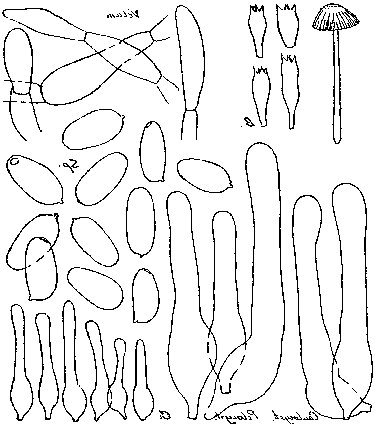Macroscopic features |
Closed pileus up to 6 x 4 mm, ochre-brown at centre, somewhat paler towards margin, up to c. 12 mm in diam. when expanded. Veil present, visible as small, whitish, radially fibrillose flocks on pileus. Lamellae narrowly adnate; L= < 18, l= 0-1 (-3). Stipe 15-30 x 0.5-1 mm, whitish, vitreous, pubescent. |
Microscopic features |
Spores [20,1,1] 8.8-11.6 x 5.0-5.7 µm, av. L= 10.4, av. B= 5.3 µm, Q= 1.70-2.15, av. Q= 1.95, subcylindric to narrowly ovoid; germ pore distinctly eccentric, c. 1.6 µm wide. Basidia 17-36 x 7-9 µm, 4-spored. Pseudoparaphyses (3-) 4-5 (-6) per basidium. Cheilocystidia 30-50 x 8-10 µm, lageniform with 3-5 µm wide neck often slightly enlarged towards (up to 6.5 µm wide) apex. Pleurocystidia absent. Pileocystidia 70-120 x 13-18 µm, broadly lageniform with 7-11 µm wide neck and equal to subclavate, 9-13 (-15) µm wide apex. Sclerocystidia absent. Veil consisting of inflated, fusiform, 6-16 µm thick hyphae present on pileus. Clamp-connections present. |
Habitat |
On bare, rich river-clay; a few together. |
Remarks |
The single collection of this taxon available consists of only a few fruit-bodies. The veil on the pileus consists of hyphae made up of elongate cells and fusiform to clavate terminal cells. The cells of this veil are larger and broader than in other species of the Setulosi with velar hyphae on the pileus. Moreover, this taxon can be distinguished from those species by its slender, (sub)cylindrical spores. |

[Copyright © by Uljé]